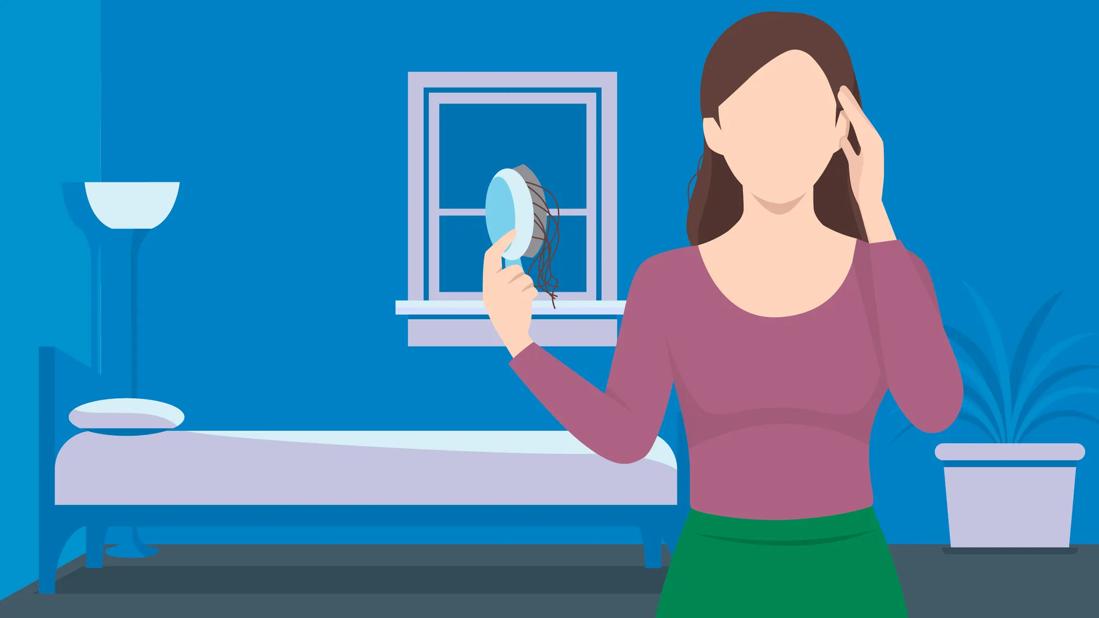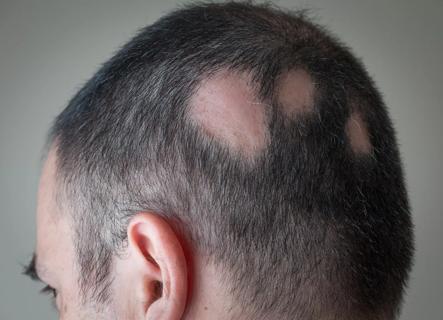Things like stress, heated styling and other health conditions may cause you to lose more hair than normal

Hair shedding is a natural process your body goes through. Even now, as you’re reading this, there are hairs on your head that are ending their growth journey and getting ready to shed.
Advertisement
Cleveland Clinic is a non-profit academic medical center. Advertising on our site helps support our mission. We do not endorse non-Cleveland Clinic products or services. Policy
But it’s understandable if a larger-than-usual clump of hair trapped in your brush or clogging your shower drain surprises you. You may wonder, “Am I losing hair permanently?” Typically, it’s nothing to be alarmed about.
But noticeable bald patches, increased thinning and losing more hair than usual can be signs of increased shedding or, in some cases, permanent hair loss.
Dermatologist Wilma Bergfeld, MD, explains the difference between hair shedding and hair loss, and how to know if the hair you’re losing is something to be concerned about.
On average, you can expect to lose between 50 and 150 hairs daily. Yes, this may seem like a lot, but look at it this way: You have around 100,000 (or more) hair follicles on your head. So, routine hair shedding is just a drop in the bucket. This will also depend on the length and thickness of your hair.
For example, you’ll appear to shed less if you have shorter or thinner hair.
“Hair goes through cycles, where it grows and then falls out,” explains Dr. Bergfeld. “So, you should expect some shedding.” This is because our hair goes through a natural cycle that includes three main phases:
Advertisement
Hair shedding is a normal part of the growth process. After a hair leaves your head, it allows new strands of hair to grow.
You may wonder if your sex affects how much you shed or if you’re more at risk for permanent hair loss.
Here’s what we know: Studies have shown that, in general, men are more likely to experience hair loss than women. On the other hand, women are more likely to experience higher levels of shedding during pregnancy and menopause. Over half of all women will experience noticeable hair loss over time.
In addition, a study in 2017 showed that women tend to shed more hair due to styling practices. But this may have less to do with sex and more to do with how they treat their hair. In other words, anyone who uses heavy styling or tight hairstyles can experience increased shedding, which can lead to permanent hair loss if it becomes chronic.
Remember, hair loss isn’t the same as hair shedding. While hair shedding is a normal part of the hair growth process where our “dead hair” falls out to make room for new strands to grow, hair loss is when you lose hair and it stops growing. But shedding more than usual can be a sign of problems, too.
But in these cases, you may be able to adjust your lifestyle, diet or grooming practices to help strengthen your hair.
Here are some things that can cause hair to shed excessively.
There’s a reason hair usually falls off your head during certain routines, such as washing or styling. This is when your hair follicles are stimulated and moved around. So, the strands already in the shedding phase or close to it get nudged out.
In addition, tight ponytails, braids and other hairstyles can all cause hair loss and damage the follicles, which regulate hair growth. Changing up your hairstyles (or opting for looser ones) can help prevent thinning.
Have you ever heard someone use the phrase “I’m pulling my hair out” to describe being stressed? It turns out this exaggerated saying has some truth to it. When your body and mind feel more stressed, it can actually cause more hair shedding than usual. This is because when you’re stressed, your body releases a chemical called cortisol, which can put your body into overdrive.
So, while your hair typically spends most of its time in the growing phase, stress can cause more of it to move into the shedding phase too quickly.
But don't worry. Dr. Bergfeld reassures that once you relieve your stress and your body returns to normal, your hair should also start growing normally. Your time of stress may be pushing out hairs that are already in the resting phase or push them into a resting phase prematurely. But hair should grow back over time within six to 12 months.
Advertisement
Some medicines and therapies, like chemotherapy used to treat cancer, work by attacking rapidly dividing cells in the body. Hair follicles are one of these rapidly dividing cells, so these treatments can affect them too, causing hair to fall out rapidly.
Other medications, like certain antidepressants or anticoagulants (blood thinners), might have a side effect of hair loss because they can disrupt the natural cycles of hair growth or affect hormone levels in your body.
Some medications can directly affect the hair follicles, weakening them or causing them to shrink, making the hair more likely to fall out. But in many cases, the hair loss caused by medications or therapies is temporary. Once you stop taking the medicine or finish the therapy, your hair usually starts growing back within a few months.
But in some cases, the hair loss might be permanent. This is more likely if the medication or therapy damages the hair follicles.
“For example, certain cancer treatments, like high doses of radiation, can permanently damage hair follicles stem cells, which are growth cells, leading to permanent hair loss in the treated area,” Dr. Bergfeld explains.
In some cases, what you eat (or don’t eat) can affect hair growth as well. Your body needs various nutrients to help it function properly, including keeping your hair healthy and strong. Not getting enough protein, iron or certain vitamins, like biotin and B12, and micronutrients can lead to increased hair shedding or weakening of the hair follicles. Here are the nutrients your body needs to help maintain healthy and strong hair:
Advertisement
In most cases, hair loss caused by nutritional deficiencies is temporary. Once you get enough of the necessary nutrients through your diet or doctor-approved supplements, your hair health should improve.
As we all lose a certain amount of hair, it can be tricky to figure out if you’re losing too much. “If you feel like you’re losing an excessive amount of hair or developing thin or bald areas, talk to your doctor, especially your dermatologist. You’ll need an evaluation,” Dr. Bergfeld advises.
Advertisement
It may be a sign that you’re losing too much hair if:
You can also do a “pull test,” where you check how much hair you lose with a little bit of pressure. Simply run your fingers through your dry, clean hair while tugging on it gently. If a hair or two is left on your hands after doing this once, it’s probably nothing to worry about. But if you start to notice more hairs coming out in one or two tugs, that may be something to bring up to a healthcare provider.
Hair loss can be frustrating when it occurs more than usual. But the best thing to do is consult a healthcare provider (preferably a dermatologist) before you start to worry.
Thinning or excessive hair shedding can often be reversed or fixed. “Give your doctor a full hair history — when the thinning began, where and how extensive the thinning is, and any relevant symptoms,” Dr. Bergfeld says.
“It’s the best way to determine if hair loss is from shedding or breakage or stopped growing, which helps determine treatment.”
The key is knowing what’s expected and what isn’t. So, if you’re not seeing any red flags, your hair may just be going through its natural process. But remember, there are ways to strengthen your hair, too. Eating healthy foods, managing stress and caring for your hair can all help keep it healthy.

Sign up for our Health Essentials emails for expert guidance on nutrition, fitness, sleep, skin care and more.
Learn more about our editorial process.
Advertisement

Take steps to reduce stress by practicing meditation, finding time to relax and maintaining a healthy lifestyle

You may see pitting, brittleness or ridges in your fingernails and toenails

Your immune system may attack hair follicles anywhere on your body

It’s normal to lose around 50 to 150 strands per day to routine hair shedding

Studies are mixed, but frequently wearing very tight, warm hats could stress your follicles and lead to hair loss

Creatine does cause some side effects, but hair loss probably isn’t one of them

A gentle hair care routine, stress reduction and sun protection can help reduce flares and maintain your locks

Home remedies may help your hair, but don’t expect them to cure the autoimmune disease

Even small moments of time outdoors can help reduce stress, boost mood and restore a sense of calm

A correct prescription helps your eyes see clearly — but as natural changes occur, you may need stronger or different eyeglasses

Both are medical emergencies, but they are very distinct events with different causes